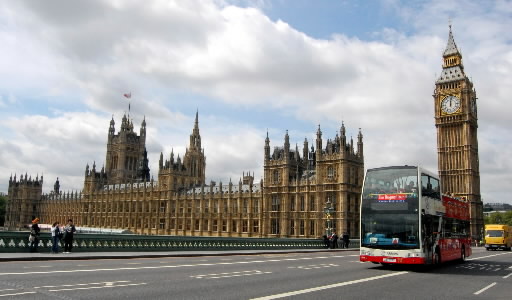Nuclear weapons can be eliminated: Chapter 5, Part 7
Jul. 22, 2009
Chapter 5: Unseen targets in the U.K. and France
Part 7: Looming choice
by Yumi Kanazaki, Staff Writer
Signs of renewed debate on nuclear disarmament
The global economic crisis is shaking the U.K.’s nuclear weapons policy.
In a statement issued in March, British Prime Minister Gordon Brown said, “If it is possible to reduce the number of U.K. warheads further, consistent with our national deterrence requirements and with the progress of multilateral discussions, Britain will be ready to do so.” This was an unprecedented statement on disarmament from the leader of the nuclear nation.
Nigel Griffiths, 54, a Labour Party Member of Parliament, welcomed the prime minister’s statement. “I commend Prime Minister Brown’s declaration,” he said. “I think this change reflected the popular will.”
Officially, the British government has not scrapped its Trident replacement plan, which calls for the building of new nuclear submarines to replace the four existing nuclear submarines that carry nuclear missiles.
In March 2007 the British House of Commons passed a motion in support of the plan. About 90 members of the ruling Labour Party voted against building the new submarines, and Mr. Griffiths, who represents the district in Scotland in which the submarine base is located, and the deputy leader of the House of Commons resigned in protest. Nevertheless, the motion passed by a wide margin with 409 in favor and 161 opposed.
But more than two years have passed since then, and signs of renewed debate in Parliament, which once gave the go-ahead, are beginning to be seen. Questions are being raised about the huge sum of money that is expected to be required to replace not only the submarines but also the nuclear warheads and the missiles.
Nick Harvey, 47, is a member of the House of Commons from the Liberal Democrats, the number three party in Parliament, and the party’s front bench. I met with him in his office in the Houses of Parliament Building facing the clock tower housing Big Ben. “I expect the figure will be around £25 billion (3 trillion, 937.5 billion yen). If we debate this in Parliament again, the outcome will certainly be reversed,” he said.
The government plans to conclude a contract to replace the submarines by 2014 and, as a first step, will prepare the design contract items this September. Members of Parliament who oppose the plan have asked for a delay. In May, David Cameron, leader of the Conservative Party, who favors maintaining Britain’s nuclear capability, also called for a review of the budget.
The U.K. is reaching a critical juncture with regard to whether or not it will abandon nuclear weapons.
But there is also a movement to seek out a “third way.” According to Mr. Harvey, there have been proposals to cut the number of nuclear submarines to two or three, to cut back on the 24-hour patrols that have continued since the Cold War era, and to cut costs by deploying medium-range cruise missiles rather than long-range ballistic missiles on the submarines.
In response, Rebecca Johnson, 54, an expert on nuclear disarmament who has consistently opposed replacement of the submarines, said, “We could cut our nuclear arsenal to zero before the U.S. and Russia do. What Britain lacks is political will and leadership.”
The U.K. is believed to be the closest to “nuclear zero” among the nuclear weapon states. The time has come when it must demonstrate whether or not it will take the first step toward a new era.
(Originally published on June 28, 2009)
To comment on this article, please click the link below. Comments will be moderated and posted in a timely fashion. Comments may also appear in the Chugoku Shimbun newspaper.








